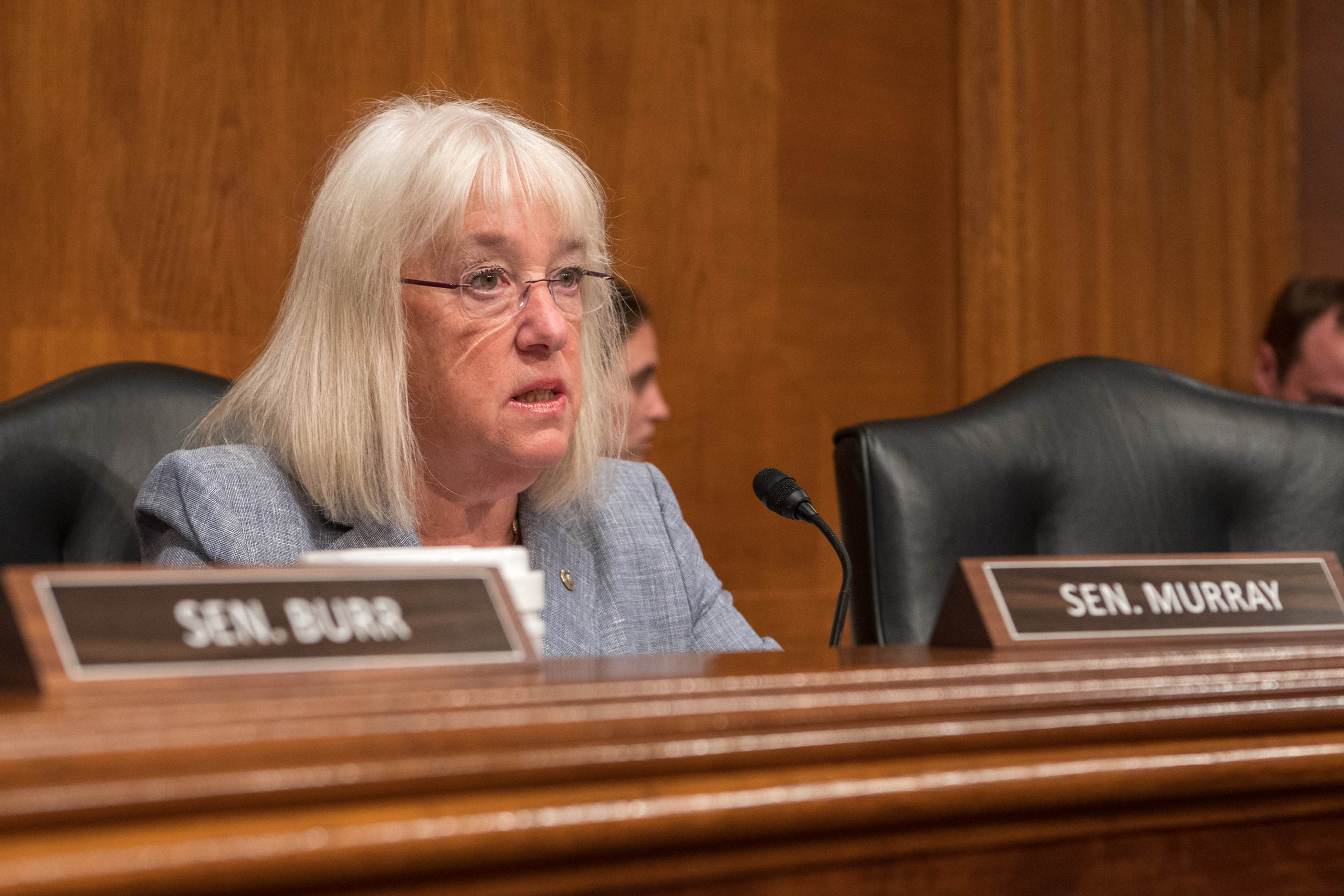Senator Murray: “It saddens and worries me, and everyone in this room, that the Army continues to see high suicide rates even as Congress continues to fund various suicide prevention programs, and oversight and research initiatives.”
Senator Murray: “We have military families—people who are already making a big sacrifice for this country—who are essentially being forced to live without access to safe, affordable housing in order to serve this country. That’s just backwards, and I really need the Army to be doing everything—and I mean everything—it possibly can to get this fixed.”
***WATCH SENATOR MURRAY’S FULL QUESTIONING HERE***
(Washington, D.C.) – Today, during a Senate Appropriations Committee Defense (SAC-D) Subcommittee hearing, U.S. Senator Patty Murray (D-WA), a senior member of the Senate Appropriations Committee, joined her Senate colleagues in questioning Army Secretary, Christine Wormuth, and Army Chief of Staff, James McConville, on President Biden’s annual budget request for the military branch.
During the hearing, Senator Murray highlighted continued high rates of suicide among Army servicemembers, following a quarterly report published by the Department of Defense showing the Army ending 2021 with the highest number of suicides among the active component of any military service. In her questioning, Senator Murray asked Secretary Wormuth about steps being taken to proactively address the ongoing mental health crisis and promote the wellbeing of soldiers and their families.
“Late last year, the Army announced it will be implementing a public health approach to suicide prevention based on CDC guidance – including a new training program. Can you give us an update on the status of that training program and the regulations for this program?”
Secretary Wormuth stated the Department of Army sought to draw from the Center for Disease Control and Prevention’s (CDC) scientifically-driven strategies in its implementation of the training program, and that the Department is continually working with their Army Resilience Directorate on how to improve its suicide-prevention training. Senator Murray requested Secretary Wormuth to continue to provide the Committee with updates on the training program.
At the hearing, Senator Murray also pushed Secretary Wormuth to fix pervasive housing issues affecting military families in Washington state. Murray referenced last week’s SAC-D hearing where she pressed Department of Defense Secretary Austin on repeated failures by the Department to provide oversight of privatized military housing following numerous concerns of deplorable living conditions and housing shortages in the state. The Army is currently requesting nearly $2 billion for military construction in the Fiscal Year 2023 budget request—of which only $600 million is for family housing. That is only a fraction of the 10-year infrastructure plan that will have the Army invest $27 billion in infrastructure over the next decade. During today’s hearing, Senator Murray urged Secretary Wormuth to do more to help military families get better housing and improve oversight while the Army’s 10-year infrastructure plan moves forward.
“We have military families—who are already making a big sacrifice for our country—but they are essentially being forced to live without access to safe, affordable housing in order to serve our country. I just think that is wrong and backwards, and I really need the Army to be doing everything—and I mean everything—it possibly can to get this fixed,” continued Senator Murray. “I understand the Army has a 10-year infrastructure plan, but that is a really long time when families need solutions right now. So can you share with me what more you’re going to do to help families and improve oversight while that 10 year plan moves forward?
Secretary Wormuth responded saying the budget includes investments for barracks at installations, including Joint Base Lewis-McChord in Washington state, and that the Department is working closely to address challenges with garrison commanders and privatized housing companies that build at military installations. She mentioned rising construction costs and labor shortages have been drawing out the Department’s ability to make progress as it would like to, but the installation command is working to be very aggressive on this issue. In her questioning, Senator Murray also inquired about how the Department will ensure the quick modernization of military forces and equipment, and how it will confirm they will work as intended during armed conflict.
The daughter of a World War II veteran and also a senior member of the Senate Veterans’ Affairs Committee, Senator Murray has been a longtime advocate of military servicemembers and their families. In September of last year, she announced temporary increases to rental housing allowances from the DoD for active duty servicemembers, to help alleviate the financial burden of spiking housing costs faced by servicemembers relocating to military housing areas (MHAs).
In December of last year, she and U.S. Representative Cathy McMorris Rodgers announced that the Air Force will include Fairchild Air Force Base in a FY23 Housing Requirement and Market Analysis (HRMA). The move followed the two lawmakers’ letter to Secretary of the Air Force Frank Kendall earlier that month calling on the Air Force to conduct a full HRMA for Fairchild AFB in Spokane in order to assess and better address the affordable housing needs of servicemembers and their families at the base.
In addition, Senator Murray helped pass the National Defense Authorization Act for Fiscal Year 2022 (NDAA). Senator Murray championed measures in last year’s NDAA to support quality of life improvements for servicemembers and their families, such as a 2.7% pay raise for military servicemembers, 12 weeks of parental leave for servicemembers, establishing a Basic Needs Allowance for servicemembers, and inclusion of provisions from the Military Justice Improvement and Increasing Prevention Act to address sexual assault in the military.
###


